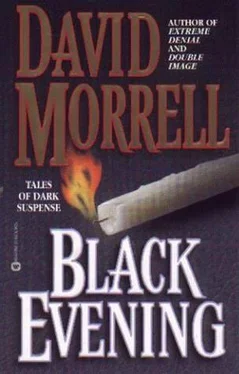David Morrell - Black Evening
Здесь есть возможность читать онлайн «David Morrell - Black Evening» весь текст электронной книги совершенно бесплатно (целиком полную версию без сокращений). В некоторых случаях можно слушать аудио, скачать через торрент в формате fb2 и присутствует краткое содержание. Жанр: Ужасы и Мистика, на английском языке. Описание произведения, (предисловие) а так же отзывы посетителей доступны на портале библиотеки ЛибКат.
- Название:Black Evening
- Автор:
- Жанр:
- Год:неизвестен
- ISBN:нет данных
- Рейтинг книги:4 / 5. Голосов: 1
-
Избранное:Добавить в избранное
- Отзывы:
-
Ваша оценка:
- 80
- 1
- 2
- 3
- 4
- 5
Black Evening: краткое содержание, описание и аннотация
Предлагаем к чтению аннотацию, описание, краткое содержание или предисловие (зависит от того, что написал сам автор книги «Black Evening»). Если вы не нашли необходимую информацию о книге — напишите в комментариях, мы постараемся отыскать её.
Black Evening — читать онлайн бесплатно полную книгу (весь текст) целиком
Ниже представлен текст книги, разбитый по страницам. Система сохранения места последней прочитанной страницы, позволяет с удобством читать онлайн бесплатно книгу «Black Evening», без необходимости каждый раз заново искать на чём Вы остановились. Поставьте закладку, и сможете в любой момент перейти на страницу, на которой закончили чтение.
Интервал:
Закладка:
Robert Browning's "My Last Duchess" supplied the answer.
It's called a "dramatic monologue," a technique he's given credit for creating, not in a play (where a soliloquy's an accepted convention) but on a page, in a poem! "That's my last Duchess painted on the wall," Browning begins, or rather his narrator does. And I thought, Who is the speaker addressing? And how did the reader happen to receive these words? The technique is unbelievable, artificial, yet wonderfully effective. Around the same time, I fell in love with the novels of James M. Cain. "They threw me off the hay truck about noon." That's how The Postman Always Rings Twice begins, one of the all-time great first sentences, in one of the greatest thrillers ever written.
But Cain's narrator wasn't addressing an imagined audience viewing a stage. No, that damned fate-controlled aggressor/victim was writing his story as a form of confession while he waited, tough and controlled, to be executed for murder.
So I asked myself, Why not pretend you never read James?
Why not concentrate on Browning and Cain? And that decision broke my short story writer's block. I embraced the first person technique. It's direct. It's intimate. It's vivid. And it allows a writer to compress. The tormented narrator blurts out his tale of horror. Until the end of "But at My Back I Always Hear," the story is due to Browning. But when the hero-victim picks up the pen and paper in his hotel room and reveals that all along he's been writing his tale of terror, as a document, so the people who find his body will understand his predestined doom, that's Cain, and God bless him. He showed me the way.
Now about theme. For reasons too complex to elaborate in this brief space, I'm obsessed about security. That topic is manifest in all of my work. The worst horror I could ever imagine was to lose my family, to lose a member of my family, to be separated from those I love. In real life, that horror became all too factual. On June 27,1987, my wonderful fifteen-year-old son, Matthew, died (after six months of agony) from bone cancer. I described that ordeal in a book called Fireflies . But in "The Dripping" and other stories before Matthew's death, I was already terrified by versions of that ultimate horror. The narrator in "But at My Back I Always Hear" loses everything he cherishes. Not because it's his fault. But because of fate . Because sometimes things don't work out. Because, God help me, life isn't fair.
Then too, I was a professor of literature, and I did have a student who claimed I was sending sexual telepathic messages to her. She did keep calling, threatening, haunting – not only me (I can deal with that) but my family . Most of "But at My Back I Always Hear" is true. Except that the student is still alive and, for all I know, lurking.
Finally, after I moved from where I was raised in Canada to graduate school in Pennsylvania and then to the University of Iowa, I fell in love with the boundless sky and intoxicating fertile beauty of my adopted state. I call it exotic. Watch the movie Field of Dreams to understand what I mean. It occurred to me that horror didn't have to fester in the traditional Hawthorne-invented gloom of New England, or in the oppressive ghettos of decaying major cities, but in bright sunlight, in the midst of splendor. Remember Cary Grant racing desperately to escape the machine-gun bullets from the "innocent" cropduster in Hitchcock's North By Northwest ? I began to envision a series of stories that would take advantage of the broad Midwest and Interstate 80 and the space, the sublime, hence terrifying space between one isolated community and another. I explored that notion in several stories: "The Storm," "For These and All My Sins." Others. Even the time zone changes are fraught with danger.
So if you desperately need security (as the hero of "But at My Back I Always Hear" does and as its author does), you choose this story as representative of your work. My alter-ego professor sacrifices his life and his soul for his family. Good man. I understand him all too well. Because given the chance, I would gladly have sacrificed my life and soul to save my son.
But at My Back I Always Hear
She phoned again last night. At three a.m., the way she always does. I'm scared to death. I can't keep running. On the hotel's register downstairs, I lied about my name, address, and occupation. Although I'm here in Johnstown, Pennsylvania, I'm from Iowa City, Iowa. I teach – or used to teach until three days ago – American literature at the University. I can't risk going back there. But I don't think I can hide much longer. Each night, she comes closer.
From the start, she scared me. I came to school at eight to prepare my classes. Through the side door of the English building I went up a stairwell to my third floor office, which was isolated by a fire door from all the other offices. My colleagues used to joke that I'd been banished, but I didn't care, for in my far-off corner I could concentrate. Few students interrupted me. Regardless of the busy noises past the fire door, I sometimes felt that there was no one else inside the building. And indeed at eight a.m., I often was the only person in the building.
That day I was wrong, however. Clutching my heavy briefcase, I trudged up the stairwell. My scraping footsteps echoed off the walls of pale red cinderblock, the stairs of pale green imitation marble. First floor. Second floor. The fluorescent lights glowed coldly. Then the stairwell angled toward the third floor, and I saw her waiting on a chair outside my office. Pausing, I frowned up the stairs at her. I felt uneasy.
Eight a.m., for you, is probably not early. You've been up for quite a while so you can get to work on time or get your children off to school. But eight a.m., for college students, is the middle of the night. They don't like morning classes. When their schedules force them to attend one, they don't crawl from bed until they absolutely have to, and they don't come stumbling into class until I'm just about to start my lecture.
I felt startled, then, to find her waiting ninety minutes early. She sat tensely: lifeless dull brown hair, a shapeless dingy sweater, baggy faded jeans with patches on the knees and frays around the cuffs. Her eyes were haunted and wild. Deep and dark.
I climbed the last few steps and stopped before her. "Do you want an early conference?"
Instead of answering, she nodded bleakly.
"You're concerned about a grade I gave you?"
This time, though, in pain she shook her head from side to side.
Confused, I fumbled with my key and opened the office, stepping in. The room was small and narrow: a desk, two chairs, a wall of bookshelves, and a window. As I sat behind the desk, I watched her slowly come inside. She glanced around uncertainly. Distraught, she shut the door.
That made me nervous. When a female student shuts the door, I start to worry that a colleague or a student might walk up the stairs and hear a female voice and wonder what's so private that I want to keep the door closed. Although I should have told her to reopen it, her frantic eyes aroused such pity in me that I sacrificed my principle, deciding her torment was so personal that she could talk about it only in strict secrecy.
"Sit down." I smiled and tried to make her feel at ease, although I myself was not at ease. "What seems to be the difficulty, Miss… I'm sorry, but I don't recall your name."
"Samantha Perry. I don't like 'Samantha,' though." She fidgeted. "I've shortened it to – "
"Yes? To what?"
"To 'Sam'. I'm in your nine-thirty Tuesday-Thursday class." She bit her lip. "You spoke to me."
Читать дальшеИнтервал:
Закладка:
Похожие книги на «Black Evening»
Представляем Вашему вниманию похожие книги на «Black Evening» списком для выбора. Мы отобрали схожую по названию и смыслу литературу в надежде предоставить читателям больше вариантов отыскать новые, интересные, ещё непрочитанные произведения.
Обсуждение, отзывы о книге «Black Evening» и просто собственные мнения читателей. Оставьте ваши комментарии, напишите, что Вы думаете о произведении, его смысле или главных героях. Укажите что конкретно понравилось, а что нет, и почему Вы так считаете.












